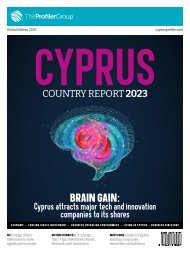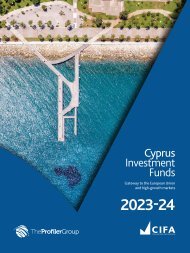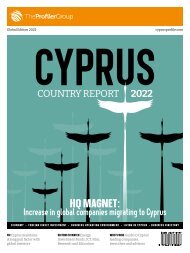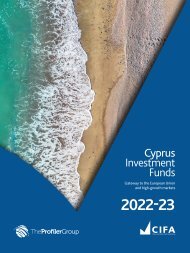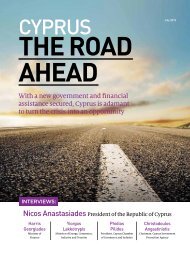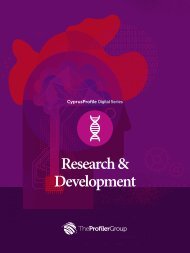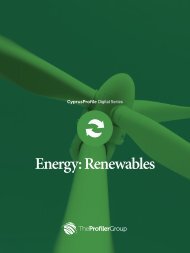2020 Cyprus Country Report
The 2020 Cyprus Country Report features in-depth articles on the economy, foreign direct investment, international trade and headquartering as well as detailed sector profiles and insights from Cyprus’ 100 most influential political, economic and business leaders shaping the future of their country and its industries.
The 2020 Cyprus Country Report features in-depth articles on the economy, foreign direct investment, international trade and headquartering as well as detailed sector profiles and insights from Cyprus’ 100 most influential political, economic and business leaders shaping the future of their country and its industries.
You also want an ePaper? Increase the reach of your titles
YUMPU automatically turns print PDFs into web optimized ePapers that Google loves.
Energy: Renewables<br />
Sector Profile<br />
sources. The potential of the latter is enormous,<br />
both in terms of clean energy and low electricity<br />
prices.<br />
<strong>Cyprus</strong> is reliant on heavy fuel oil and diesel<br />
imports for its electricity needs and spends over<br />
8% of its GDP to cover the costs. However, the<br />
country has embarked on a plan to import LNG<br />
for power generation by 2022 over a 20 to 30-year<br />
period so that it can reduce carbon emissions in<br />
line with EU targets, and until it can exploit its<br />
own gas reserves. The EU agreed in January 2018<br />
to partially fund the cost to build infrastructure at<br />
Vassilikos for this purpose to the tune of €101.5<br />
million, constituting about 40% of the eligible<br />
amount.<br />
The Natural Gas Public Company (DEFA), as<br />
the sole importer and distributor of natural gas<br />
on the island, announced tenders in 2018 for the<br />
construction of the required infrastructure at<br />
Vassilikos. This was successful and in December<br />
2019 DEFA signed a landmark deal with a<br />
Chinese-led consortium to build a €290 million<br />
LNG import terminal at Vassilikos. Construction<br />
started in July <strong>2020</strong>, and has been followed by a<br />
separate tender for the procurement of LNG with<br />
23 companies expressing interest to participate.<br />
Tenders are under evaluation. Progressively, the<br />
project will include the introduction and use of<br />
natural gas by the transport, industry and energy<br />
sectors in <strong>Cyprus</strong>.<br />
HARNESSING THE SUN<br />
Solar energy is increasingly becoming a boom<br />
segment for <strong>Cyprus</strong>. The European Bank for<br />
Reconstruction and Development (EBRD) alone<br />
has financed five solar parks across the island<br />
with an investment of €10.85 million in a bid to<br />
increase photovoltaic capacity in <strong>Cyprus</strong> by 12%.<br />
Scandinavian Solar Parks, a <strong>Cyprus</strong> company<br />
with Swedish investors, has established nine solar<br />
power generation parks with a capacity of around<br />
1,300 KW of energy. Local Cyfield runs a 3 MW<br />
PV park in Ayios Ioannis, while the Electricity<br />
Authority of <strong>Cyprus</strong> (EAC) operates its own PV<br />
park in Tseri with a nominal capacity of 3 MWp,<br />
generating some 5,000 MWh per year and avoiding<br />
3,600 tonnes of carbon dioxide emissions per<br />
year. The state power company also has an ambitious<br />
project planned to self-finance and operate<br />
a 20 MW photovoltaic (PV) power station inside<br />
the Sovereign Base Area (SBA) of Akrotiri. In<br />
addition, PROTEAS, a solar field on the island’s<br />
southern coast in Pentakomo aims not only to<br />
generate electricity but to provide fresh water by<br />
powering energy intensive desalination plants.<br />
The research facility is a result of a partnership<br />
between the Commonwealth Scientific and<br />
Industrial Research Organisation (CSIRO) and<br />
the <strong>Cyprus</strong> Institute (CyI), which is pioneering<br />
research in renewable energy systems.<br />
In addition, the EAC forged a deal with the<br />
country’s Archbishopric in July 2018 to develop<br />
two photovoltaic parks in Nicosia, producing<br />
around 66 MW. The project is set to be the largest<br />
PV system in <strong>Cyprus</strong>, contributing to the island’s<br />
national renewable energy sources targets.<br />
These are all positive developments, but there<br />
continues to be untapped potential in terms of<br />
renewable energy production, and international<br />
interest in developing the sector in <strong>Cyprus</strong> is expected<br />
to increase considerably in the coming<br />
years. This investment is also crucial in order for<br />
<strong>Cyprus</strong> to achieve its targets – and further open<br />
up the field for companies with expertise in renewables.<br />
<strong>Cyprus</strong>’ largest PV park, an 8 MW facility,<br />
started subsidy-free operations in February<br />
<strong>2020</strong>. This was developed by the Vassiliko<br />
Cement Works Company Ltd to supply around<br />
10% of the annual electricity needs of its cement<br />
factory. Under subsidy-free rules, the power will<br />
be bought by the EAC at a ‘cost-avoidance rate’,<br />
based on the average price it would have paid if<br />
the electricity had come from fossil fuels.<br />
STORING POWER<br />
A limitation in realising the full solar power potential<br />
of the island is lack of electricity storage.<br />
There is a drive to increase use of battery<br />
systems, to store excess energy and create a<br />
‘powerbank’. The first energy storage system,<br />
30 kW/50 kWh, was connected to the electricity<br />
system in Nicosia in 2018. <strong>Cyprus</strong> became<br />
the testing ground for an innovative community<br />
project delivered by a German electric utility<br />
company Autarsys, where 30 kW/50 kWh was<br />
connected to a conventional distribution substation<br />
in Nicosia. The project provided the opportunity<br />
to interact with real battery systems and<br />
gather knowledge about their operation, branding<br />
the efforts as a success. State-of-the-art highvoltage<br />
lithium-ion batteries were used, and the<br />
battery system provided services to the distribution<br />
network, such as power balancing, network<br />
and frequency support, as well as services that<br />
stabilise and protect the seamless operation of<br />
the network and are considered essential for<br />
modern power networks. The project received<br />
funding from the European Union’s Interreg<br />
Mediterranean research and innovation programme<br />
under the project StoRES.<br />
An innovative EU project, also under the<br />
StoRES project, involving <strong>Cyprus</strong>, Greece, Italy,<br />
Spain and Portugal is supporting the development<br />
of optimal policy for the effective integration<br />
of energy storage systems. It aims to boost<br />
<strong>Cyprus</strong> needs<br />
to invest in<br />
drawing up<br />
a longterm<br />
consolidated<br />
sustainable energy strategy.<br />
Now is the time to invest in<br />
new sustainable technologies,<br />
to manage our energy resources<br />
and needs in an optimal<br />
way, to reduce the impact on<br />
the environment and to ensure<br />
our future energy security. We<br />
need to start working right now<br />
for a more sustainable <strong>Cyprus</strong><br />
by 2050. We need to accelerate<br />
the country’s transition<br />
towards a hydrogen economy.<br />
Andreas Poullikkas<br />
Chairman<br />
<strong>Cyprus</strong> Energy Regulatory<br />
Authority (CERA)<br />
A key aim is to<br />
make <strong>Cyprus</strong><br />
a hub for solar<br />
innovation,<br />
technology<br />
transfer, industry<br />
start-ups and job<br />
creation where<br />
ideas can grow<br />
and achieve their<br />
full potential<br />
86 <strong>Country</strong> <strong>Report</strong> CYPRUS <strong>2020</strong>



